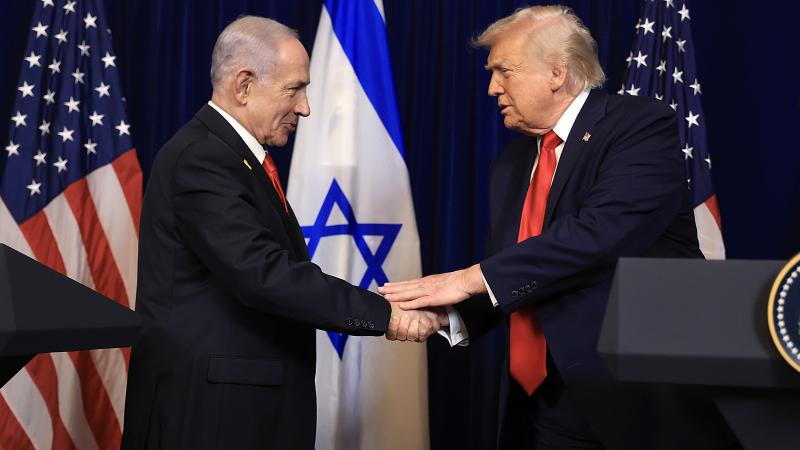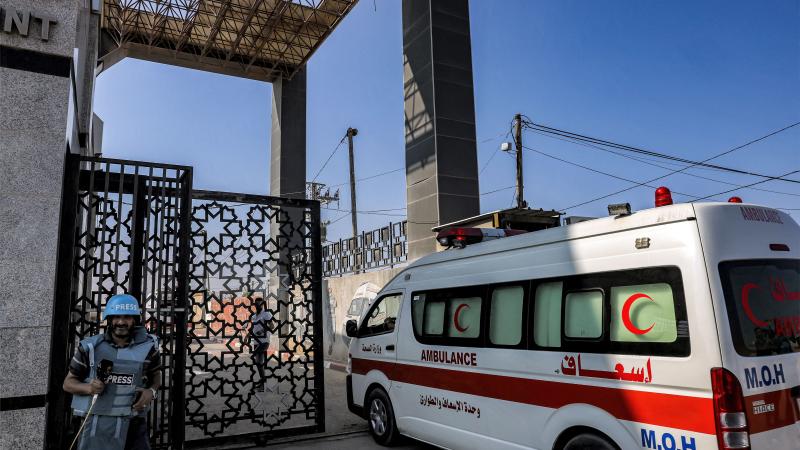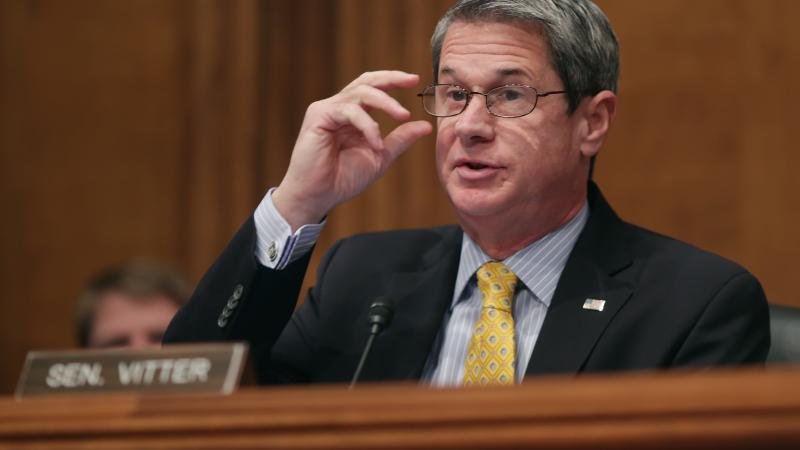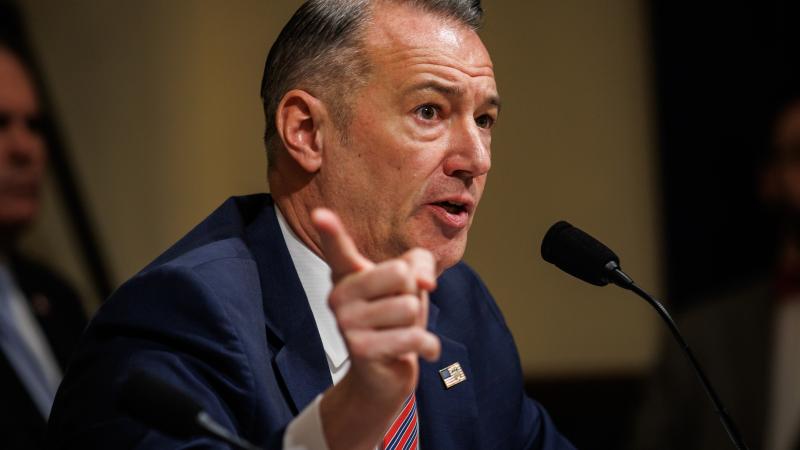As Iranians protest and regime cracks down, analysts, activists condemn Biden's 'baffling' response
Congress and activists nationwide are rallying in support of spreading protest movement amid fears of increasing government violence.
The Biden administration's response to the most widespread anti-government protests in Iran in recent memory has been weak and counterproductive, according to analysts and Iranian opposition leaders who spoke to Just the News.
Concerns about the U.S. approach to the ongoing demonstrations come as the Iranian regime is increasingly using violence in a so-far-unsuccessful attempt to quell the protests.
Regarding the demonstrations, "the response from the Biden administration has been weak and baffling," said Saeed Ghasseminejad, a senior adviser at the Foundation for Defense of Democracies. "While the regime in Iran is killing and beating protesters, the Biden administration is assuring the regime that if it accepts Washington's nuclear offer, the United States will facilitate the regime's access to hundreds of billions of dollars."
Ghasseminejad was referring to the 2015 nuclear deal — officially called the Joint Comprehensive Plan of Action, or JCPOA — which placed temporary curbs on Iran's nuclear program in exchange for lifting significant economic sanctions on Iran.
According to a Foundation for Defense of Democracies analysis, the new deal would give Iran access to $274 billion in its first year and at least $1 trillion by 2030. Experts have expressed concern that Iran will use the increased funds to further its aggression abroad and oppression at home.
"We have many concerns with Iran," a National Security Council spokesperson told Just the News. "The JCPOA is the best way for us to address the nuclear problem. As long as we believe pursuing JCPOA talks is in U.S. national security interests, we will do so."
Meanwhile, anti-government protests have been raging across Iran since last month, when a young woman died in the custody of Iran's so-called morality police, who had allegedly detained her for wearing a hijab, an Islamic head covering that's mandatory for women in Iran, in an "improper" way.
Since then, the protests have grown in scope and intensity, reaching all of Iran's 31 provinces and about 170 cities, according to local reports and the organized Iranian resistance movement. Chants calling for the overthrow the regime have been common at many of the protests.
While Iran has experienced several rounds of sporadic anti-government demonstrations in recent years, experts are noting this time seems different.
"This round is more widespread than any other protest in Iran," said Ghasseminejad. "It has united a massive number of Iranian women and men of all socioeconomic classes, ages, and ethnicities around the goal of pushing this regime to the dustbin of history. I can't predict what will happen, but the regime is closer to its fall than any other time."
For the Iranian resistance, the current demonstrations also represent a watershed moment.
"Iranians are determined to overthrow the mullahs' regime and are willing to pay the price," said Maryam Rajavi, president-elect of the National Council of Resistance of Iran (NCRI), a coalition of Iranian opposition groups. "These uprisings have taken a strategic stride towards the regime's eventual downfall.
"The situation will never go back. The regime has received severe blows, and its mercenaries are disillusioned, worn out, and fragile."
The regime has increasingly resorted to force to try to stop the protests, to no avail.
On Sunday, Iranian security forces beat, shot, and detained students demonstrating at Sharif University in Tehran, the Iranian capital. As part of the crackdown, Iran's Islamic Revolutionary Guard Corps (IRGC), a state military force and U.S.-designated terrorist organization, reportedly trapped hundreds of students in the parking lot before detaining many.
Fears are mounting that violence will only escalate, although it may not reach a mass scale — but only out of practicality, not morality.
"I believe the reason the regime has not yet killed thousands is not that it does not want to do it," said Ghasseminejad. "The regime's legitimacy is at its lowest point, and [Iran's Supreme Leader Ali] Khamenei may fear murdering thousands of protesters in front of everyone will cause cracks in the security-military establishment which can lead to a quick collapse of the regime."
So far, at least 400 people have died during this latest of round protests, 131 of whom have been identified, and more than 20,000 have been detained, according to figures provided by the opposition.
Khamenei on Monday blamed the U.S. and Israel for the protests without evidence, arguing they seek to undermine the regime. He also pointed a finger at "traitorous Iranians abroad," referring to the People's Mojahedin Organization of Iran (MEK), an exiled Iranian opposition group.
"Those who ignited unrest to sabotage the Islamic Republic deserve harsh prosecution and punishment," said Khamenei, calling Amini's death an "accident."
The Biden administration has spoken out against the regime and in support of peoples' right to protest peacefully without harassment. However, critics say the administration's words have been hollow, insufficient, and even counterproductive.
"We're alarmed and appalled by reports of security authorities responding to university students' peaceful protests with violence and mass arrests," White House Press Secretary Karine Jean-Pierre said aboard Air Force One on Monday.
"We're all alarmed & appalled by Iran's behavior," Jason Brodsky, policy director of United Against Nuclear Iran, tweeted in response. "But instead of contracting these statements out to the State Department and White House spokespersons, [Biden] should make remarks or at least issue a statement in his name."
Days earlier, National Security Adviser Jake Sullivan, said that seeking to revive a nuclear deal with Iran "will not stop us in any way from pushing back and speaking out on Iran's brutal repression of its citizens and its women."
The nuclear deal, however, would provide a windfall of cash to the IRGC, which both dominates Iran's economy and coordinates domestic repression, according to Michael Rubin, a senior fellow at the American Enterprise Institute.
"As the Biden administration approves ever more concessions, reverses maximum pressure, and declines to enforce existing sanctions, it pumps money into the Islamic Republic's system of repression," wrote Rubin. "Biden administration officials might give the occasional word of support for human rights in Iran, but this is no more meaningful to Iranian women risking everything in the streets or the clerical leadership seeking their submission than beseeching the Taliban to respect women helps Afghans."
Brodsky echoed this point, tweeting, "A return to the Iran nuclear deal risks resourcing the very entities who abuse the Iranian people."
Iranian activists from the son of the late shah to demonstrators in Washington, D.C. standing in solidarity with the Iranian protesters have also expressed resentment toward Biden, saying he's single-mindedly focused on the nuclear deal and has "yet to help our people."
Following such pressure, Biden issued a statement under his own name on Monday evening saying he's "gravely concerned about reports of the intensifying violent crackdown on peaceful protestors in Iran, including students and women, who are demanding their equal rights and basic human dignity."
According to critics, however, words aren't enough.
"With all due respect, what good does Biden's nicely worded message do for the brave people protesting on the street of Iran, when he is as committed as ever before to give Tehran billions to oppress the Iranian people?!" wrote Xiyue Wang, an American academic who was imprisoned in Iran from 2016 to 2019.
The National Security Council spokesperson noted that the administration has taken specific actions beyond issuing statements.
"The United States designated Iran's Morality Police — the institution responsible for Mahsa Amini's death — and seven senior Iranian security officials involved in human rights abuses," the spokesperson said. "The U.S. government is also taking action to support the free flow of information to the Iranian people. The Department of the Treasury issued an updated general license that will increase support for internet freedom in Iran and authorize technology companies to offer the Iranian people more options of secure, outside platforms and services."
Critics say that's not nearly enough, however.
According to conversations with experts and Iranian opposition figures, sufficient support could also include funding Iranian strikers, imposing further sanctions, ensuring unhindered access to the internet (which the regime has tried to cut off), taking these human rights matters to the U.N. Security Council, and publicly stating at the highest levels that the U.S. recognizes the rights of Iranian citizens to defend themselves by any means.
While the administration is facing backlash, Congress has taken several steps in support of the protesters.
Both the House and Senate have introduced bipartisan resolutions to back the Iranian protesters.
Reps. Seven Cohen (D-Tenn.) and Tom McClintock (R-Calif.), cochairs of the Congressional Iran Human Rights and Democracy Caucus, also issued a statement expressing support for the protesters and condemning the regime's "brutality."
Additionally, Sen. Bob Menendez (D-N.J.), chair of the Senate Foreign Relations Committee, introduced a similar resolution.
At least seven members of Congress have met with Rajavi in recent days.
These actions in Congress have been part of a multipronged campaign by the Organization of Iranian American Communities (OIAC) that's included pushing congressional action, raising public awareness, and mobilizing activists.
"The Iranian-American network is very active and proud to have bipartisan congressional support," said OIAC political director Majid Sadeghpour. "Our campaigns including rallies and candlelight vigils will continue across from the White House and other cities in solidarity with the Iranian people and their nationwide uprising to overthrow the regime, and their call for a secular, democratic, non-nuclear republic of Iran."
Making that vision a reality will require the U.S. and other countries to recognize the right of Iranians to openly rebel against the regime, according to the opposition.
"It is time for the world community to discard its policy of appeasement and rise to support the people of Iran," said Ali Safavi, a member of NCRI's Foreign Affairs Committee.
"The time has come for the world community to recognize the inalienable right of Iranian people to rebel and fight against the regime," added Safavi. "This right has been articulated in the Universal Declaration of Human Rights, which says, 'Whereas it is essential, if man is not to be compelled to have recourse, as a last resort, to rebellion against tyranny and oppression, that human rights should be protected by the rule of law.'"
The State Department didn't respond to a request for comment.
















